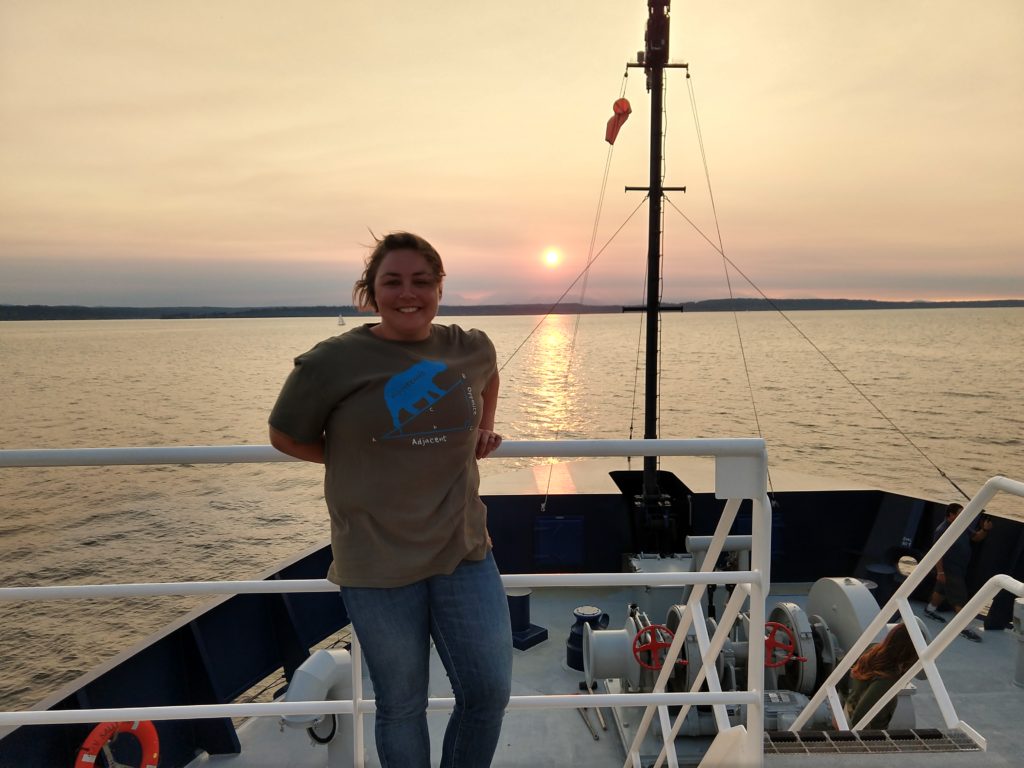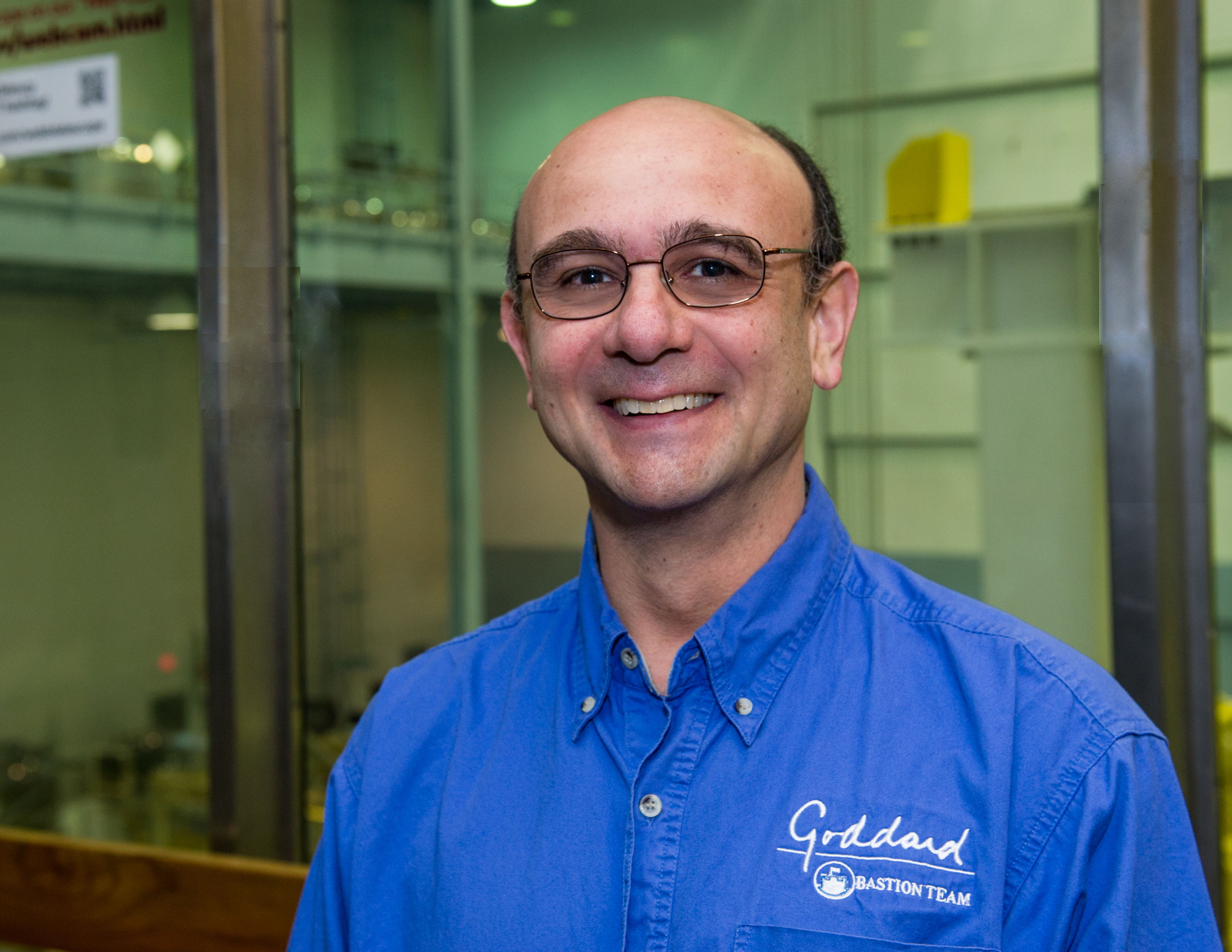STEM Career Connections
Meet Dorothy Metcalf-Lindenburger, from Geology Student to Teacher to Astronaut

Job Title
Astronaut
Dorothy Metcalf-Lindenburger
Bio
This content is taken from a speech that Dorothy Metcalf-Lindenburger gave at Whitman College's graduation ceremony on May 22, 2010.
I was born to a high school math teacher and a junior high science and shop teacher in Colorado Springs, Co. When I was 2, my dad left teaching and went to work for Hewlett-Packard. That moved us to Loveland, Co, where my little sister, Neva, was born. This is where most of my early memories and lessons began.
We went to church most every Sunday, and my parents enforced the Golden Rule. It is a simple rule to learn – do unto others, as you would have them do unto you – but for two young girls, it was not always so easy to live by. If you have siblings, then you know the drill – she did it, she started it, she’s bugging me. Sometimes, my parents could actually get us to follow this rule. One of my early memories of service is at Thanksgiving when I was in second grade. Neva and I saved our allowance to buy gloves for a needy family, and my parents bought the turkey and fixings. The family we delivered the meal to was needy – the home was sparsely furnished and the children’s teeth required care. As we were leaving, I saw that they had a color television. It would be four more years before we got one of those, and I asked my mom in the car why they were poor but had something we still did not. She simply answered, “Priorities.”
Priorities – it was clear what my parents held as their priorities: family, education, travel, and service work. Obviously two teachers, both of who also came from mothers that were teachers, are going to take educating their daughters seriously. Before we started school, we were regularly visiting the Denver Museum of Natural History checking out dinosaurs, minerals, animals, and the planetarium. The Voyager discoveries were just becoming widespread, and I fell in love with our solar system. Additionally, our summer vacations took us across the western U.S., to the fall of the Berlin Wall, to learn about the horrors of genocide, and to see the beauty of our national parks. All of this was together, as a family for bettering our knowledge of the world and people around us.
So I was raised in Colorado, but I grew up in Walla Walla. My senior year of high school, as I sifted through the piles of glossy college applications, I was struck by the simple and recycled Whitman application. I decided to take a second look; it met all of my criteria – small, in the west, great academics, and a cross-country team. I visited on a snowy afternoon in November, fell in love, and applied for early decision. Before my family headed to Hawaii for Christmas, I received the letter of acceptance.
On an August afternoon in September of 1993, I packed up my simple belongings in my parents’ minivan, and my dad and I made the 1,000-mile journey to Walla Walla. It looked much more parched than November, and I was suddenly struck with the feeling that maybe this wasn’t a good idea. Why didn’t I just go to Colorado State University like the rest of my family? Or maybe Colorado College? But this was about growing up, and I couldn’t do that 5 or 130 miles away from home.
As a student tour guide for Whitman, often I would get the questions: Don’t you feel isolated in Walla Walla? What do you do for fun? The isolation felt good to me – it seemed freeing to be away from all of the distractions of a city. I didn’t need a car to get to the wheat fields, and I didn’t have money for anything else. Fun? Well it seemed to be all around – dances on Ankeny field, running with the cross-country team, ping-ing, camping, hiking, climbing, etc.
Growing up also meant finding my own priorities, and [they don't] differ much from my parents.
Family: Although I was away from family, I found a second family. To this day, the two women I met in the Pitt – is that still what they call the basement of Jewett Hall? –are my best friends. They were in my wedding, they came to see my daughter shortly after her birth, they came to the launch of STS-131, and they answered the phone at odd hours from space. Additionally, the men and women on the cross-country team and our coach became my second family. They shared the exhilarating moments of trips to Nationals, and the agonizing process of healing from injuries. The Track House also served as a meeting place for dinners, the Winter and Summer Olympics, and Saturday runs. Family may not be blood, but it was just as close. I still make trips to catch up with this family.
Education: I came to Whitman for a quality education. I left with much more. Not many people know their professors as we know ours. It is so easy to disappear in a large university; it is so wonderful to remain connected to those who opened your mind at Whitman. From their open-door policies to doing research in the field, learning was too personal to disregard or neglect.
Learning at Whitman also led to travel. I had the opportunity to do research outside of Yellowstone National Park in the Absaroka Mountains, and south of Colorado’s Canon City, in the Wet Mountains. When you are working in the wilderness, away from television, telephones, and civilization, you often find yourself. I gained confidence in my ability to conduct fieldwork, learned to trust my field partners, and found that nature is so much more wondrous than I imagined. In Wyoming, we watched satellites on Beartooth Butte. I never would’ve imagined that I would one day be one of those satellites.
Whether it was traveling as a team or traveling for geology, travel remained a priority, as well as service. College often can isolate you to a narrow age group. To experience some diversity, I volunteered as a mentor to elementary children in Walla Walla. I started this as a freshman and continued through my senior year. Once a week, I’d drive a van to Berney Elementary School and meet with my mentee for lunch and an activity. Additionally, my senior year I volunteered at Walla Walla Community College in the ESL program. The class was comprised of Hispanics, Russians and one Japanese woman – a bit like the International Space Station. Service to others helped me keep in touch with a larger community outside of the Whitman bubble. I learned about local concerns and issues. I was touched by the effort for those in my ESL class to communicate in another language outside of English. It also showed me that teaching was in my blood. I was very at ease in the classroom.
And then 13 years ago, I stood in your shoes, ready to graduate. I was at one of the forks in the road that I would later describe to my high school students. I had fallen in love, I was offered a summer job with the U.S. Geological Survey (USGS), and I was accepted into the Peace Corps. What was I going to do? I turned down the job with the USGS, the Peace Corps put me on hold due to unrest in Kazakhstan, and I chose love. Was that the right path? According to my priorities, yes.
Family: I would go on to marry fellow Whittie and ’99 grad –Jason Lindenburger on this campus 10 years ago. We went on to have an incredible daughter. Because I couldn’t wait for Kazakhstan to help people, I went to Central Washington University to receive my teaching certification. I would spend five years teaching students, who would ultimately teach me patience, forgiveness, and how to take myself less seriously. At HBHS, I spent my first year teaching on a cart, traveling between four different rooms. I wrote curriculum and coached. I saw tragic situations – the loss of three students in one year – and I experienced moments of exhilaration – my own Science Olympiad students graduating and going to Whitman. Ultimately, a student that I’m not sure even graduated would ask me a question that took me to the NASA Web site and my dream job.
And so I stand here as one of the few that has returned from 200 miles above – space. People have asked, “Did space change you?” No – only strengthened my priorities of family, education, travel, and service. Our crew was like a family. We know each other well; we trained together for over a year and lived together in an intense environment for 15 days. I’ve continued learning in a new operations environment. From flying T38 jets, to learning the Shuttle and ISS systems, I get to be a life-long learner. And this amazing job took me on the ultimate trip. From the lightning storms of Australia, to the hues of the Sahara, to the familiar views of the volcanoes of the Pacific Northwest, I hope that I will one day visit all of the places that I gazed upon from the Cupola. More significantly, I hope that I can translate to people just how important it is for us to take responsibility for the fragile atmosphere that I could see as the sun slipped from dawn to day or day to night, the vulnerable ocean that holds its own mysteries and wonders and balances our weather systems, and the land that we fight over, but that belongs to none of us.
If I’d never had this experience, my message to you would be the same: Value your family. Continue your education. Travel so as to understand others – that you would do unto them, as you would have them do unto you. And above all, remain connected through serving others. Our time here may be very short, or blessed for 95 years long, but the time we spend here should not be concerned with building a résumé but building understanding and love.
Credit: Whitman College




